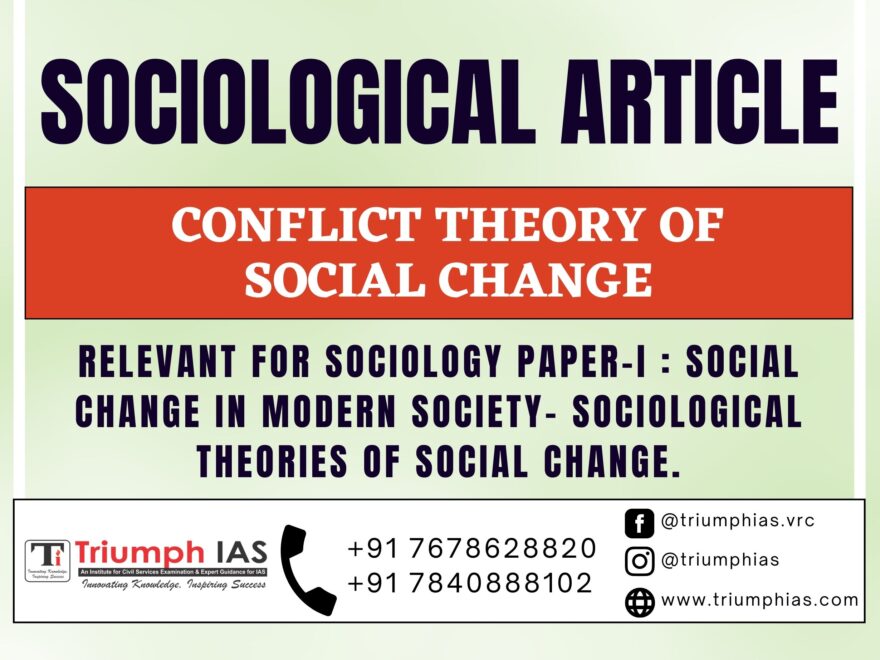CONFLICT THEORY OF SOCIAL CHANGE
Relevant for Sociology Paper-I : Social Change in Modern Society- Sociological theories of social change.
Conflict theorists focus on the conflict of interests which may lead to sudden and radical changes. Conflict theorists view conflict and change as ubiquious, all social organization as unstable and any unity as largely due to coercion.
Karl Marx and Engles are the famous exponents of conflict theory of social change. According to Karl Marx, “The history of all hither existing societies is the history of class struggle Slave-master and slave, lord and serf. Guild-master apprentice, all of them have stood in constant opposition to ad other and carried on an increasing struggle, open, which
has always ended with time secret, at time the transformation of the whole society or the mutual destruction of warring classes.”
Engles says, “The ultimate causes of all social changes political revolutions are to be sought not in the minds of men their increasing insight into the eternal truth and justice, but changes in the mode of production and exchange.”
Marx explains social change in terms of the dialectical principle the law of contradictions. He proves that structural change lies in the forces of production and relation of production which together constitute the economic structure of the society states that changes in these forces, bring about corresponding change in the superstructure of the society, the social institution values and beliefs.
Marx believes that economic factors and conditions alone responsible for social change. According to him, when society gives up one economic order and accepts the other, there is always a social change. He explains how the social order has passed through five phases called the oriental, the ancient, the feudal, the capitalist and the communist with social change. He visualises the social order in which a state of perfection by prevailing the principle “from each according to his capacities, to each according to his needs”.
According to Karl Marx, the actual vehicle of social change is class conflict. For class conflict, the relationship between ,the forces of production and relations of production is decisive. It is the contradictions between these that lead to class conflict and to revolutionary structural change.
The modern sociologists who supported the conflict theory of social change are, Lewis Coser, C.W. Mills, Raymond Aron, John Galtung, T.B. Bottomore and Ralph Dahrendorf. A number of social thinkers opposed the theory of Karl Marx and considered that the non-material elements of culture are the basis of social change. They considered the economic or material phenomenon as subordinate to the non-material elements. Gustave Le Bon, George Soret, James G. Frazer and Max Weber consider that religion is responsible for bringing about social change.
Follow us :


https://t.me/VikashRanjanSociology
Find More Blogs
|
Scope of the subject and comparison with other social sciences |
|||
|
|
|
|
Modernity and social changes in Europe |
#Sociologyforupsc #sociologyforupscinhindi #sociologyforupscgs1 #sociologyforupscprelims #sociologyforupscinenglish #sociologyforupscmainsinhindi #sociologyforupscoptionalinhindi #sociologyforupscmains #sociologyforupscplaylist #sociologyforupsclecture1 #sociologyforupsccse #sociologyforupscoptional #syllabusofsociologyforupscoptional #bestbookforsociologyforupsc #sociologyoptionalforupscanswerwriting #sociologyoptionalforupscanukumari #sociologyoptionalforupscabhijeet #sociologyoptionalforupscanalysis #sociologyoptionalforupscalllectures #sociologysyllabusforupscanalysis

